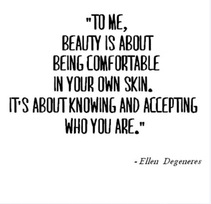 Take a minute sometime to observe any infant: No matter what they look like, they are surprised and delighted at their bodies. They coo and gurgle at discovering their toes, finding they can hold, and are constantly engaged with their own body. What happens to that joyful, positive curiosity about our bodies when we grow? The answer is that we learn to NOT be body positive. Every day, we are bombarded with images of perfect bodies, smiles, hair and smells in a million marketing commercials, showing those ‘perfect’ people succeeding while in the background ordinary people look on in envy. Is it really true? Do better looks and six-pack abs actually guarantee you success? Well, there is no concrete proof of that, and in fact, the opposite has been shown to be true: If you don’t feel good about your body as it is, you are likely to be less happier. Don’t get me wrong: I am not saying one should not exercise or be well put-together. I am saying you can be fit, healthy and smart no matter what your body is like – no matter your skin colour, hair volume, body type etc. How to know if you are body positive? Look at yourself in the mirror: 1. Notice 5 things you really like about your body 2. Notice 5 things you really dislike about your body If 2 was easier, you have probably taken to heart many of the hurtful messages from the media, society or even in what you tell yourself, and it is time to come back to being body positive. How to get back to being body positive? Here are 5 basic things you can practice: 1. Stop commenting on others’ bodies. Assume that everyone knows their body and love how it is 2. Don’t assume anything by how one looks. Fat people aren’t necessarily lazy. Fair skinned people need not be fair in their dealings with others. 3. If someone comments on your body, just accept it. “You have become dark” is only a bad thing, if you let it be 4. Reject the media’s portrayal. Remember: The dark, very hairy & moustached Anil Kapoor was the hottest actor some 20 years ago! 5. And above all: Love your body. Be grateful for it Enjoy what your body allows you to do. Treat your body with kindness & gentleness like you’d treat a good friend! (Reposted with Permission from our column in Frazer Times)
We all have one — an inner voice that expresses criticism, frustration or disapproval about our actions. It might sound like, “you should,” “why didn’t you?” “What’s wrong with you?,” or “why can’t you get it together?” The actual self-talk is different for each of us, as is its frequency or intensity. It is a cultural norm to believe that criticism or guilt-induced comments will motivate behavior Over time, these comments internalize and become our “inner critic,” the persistent negative self-talk that keeps us stuck. Unfortunately, this type of communication is anxiety-provoking and shaming, which is the opposite of motivation. When we feel shame, we feel that something about us makes us so flawed that we don’t deserve to be in connection with other people. Shame disconnects us from others. The point is that shame and self-criticism keep us from doing the things we need to take care of ourselves and ultimately find comfort, connection and motivation. Awareness is the first step to recognizing and letting go of your inner critic. Many of us don’t even realize its presence. Catch yourself the next time you’re aware of feeling anxious, distracted or numb. Identify the voice of the inner critic. Identify the situation that may have triggered the inner critic. What are your genuine feelings about this situation? Remember, the inner critic helps you to feel in control. So ask yourself, “What am I afraid of? What would it mean if that happened? And what would that mean?” Allow yourself space to dig deeper and find your most vulnerable feelings about the situation. This is what the inner critic is protecting you from feeling. Do you really need all that protection? Probably not. The inner critic’s self-talk tends to fall into one of two categories, “bad self” and “weakness.” Bad self is shame-based. Those who struggle with it might feel flawed, inferior, inadequate, deserving of punishment or incompetent. The weak self is based on fear and anxiety. Those who fight it might feel dependent on others, unable to support themselves, submissive, vulnerable; worried about loss of control, isolated, deprived or abandoned. These beliefs are neither useful nor helpful. They are generally destructive. Practice listening for clues to these beliefs by paying attention to the self-talk of your inner critic. Go on, challenge those beliefs! |
InnerSight BloggersAjanta, Mahesh and other InnerSight counsellors and guest contributors are happy to share their thoughts here. Categories
All
Archives
September 2020
|

 RSS Feed
RSS Feed